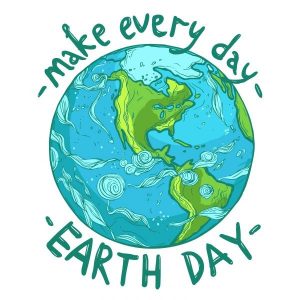(Akiit.com) For most of my life, Earth Day has been a stark reminder of yet another American tradition in which the basis was formed without people of color in mind. In 1970, the first Earth Day, like the passage of the National Environmental Policy Act and the founding of the United States Environmental Protection Agency that same year, was held in response to series oil spills throughout the 1960s. Earth Day in particular was prompted by an oil spill off the Pacific coast of Santa Barbara—a predominantly White, affluent beachfront community. To me, Earth Day has been less about promoting the public health and well-being of all individuals through conservation and environmental protection and more about protecting the pristine land owned and occupied by wealthy, White people.
The shift toward intentional inclusion of frontline communities in the environmental movement over the past few years makes this Earth Day different for me; it will be different, because when I look around the country and see oppressed populations rising up and staking  their claim in this movement. One prominent example of this has been the increased national capacity and presence of NAACP’s Environmental and Climate Justice Program. That will be evidenced this Earth Day as NAACP chapters around the country are hosting activities to engage communities of color in ways tied to deeper social justice and civil rights efforts that are taking place year-round. Needless to say, you won’t just see us planting trees on Earth Day 2018 and going on hiatus until the Earth Day 2019.
their claim in this movement. One prominent example of this has been the increased national capacity and presence of NAACP’s Environmental and Climate Justice Program. That will be evidenced this Earth Day as NAACP chapters around the country are hosting activities to engage communities of color in ways tied to deeper social justice and civil rights efforts that are taking place year-round. Needless to say, you won’t just see us planting trees on Earth Day 2018 and going on hiatus until the Earth Day 2019.
As we wrestle with various environmental issues in Michigan, we enter Earth Day with our eyes on the prize: clean air to breathe and safe water to drink. As local oil refineries, trash incinerators, and corporate and municipal utility companies continue to pollute our air with toxic emissions, the Michigan NAACP continues to challenge coal-based permits to install, permits to increase toxic emissions, and the expansion of facilities who already have unchecked violations.
Recently, we also undertook efforts to protect our drinking water sources by providing substantive written public comments on Michigan’s proposed revisions to the Lead and Copper Rule, lifting up our most vulnerable communities and calling for the standard to be zero parts per billion, because we know that no level of such a contaminant in our drinking water is safe.
Learn more about the NAACP’s environmental justice initiatives at NAACP.org.
Columnist; Jeremy Orr
Official website; http://twitter.com/jeremyforr









Leave a Reply